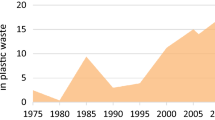Abstract
Waste reduction activities such as recycling, composting, and pig feeding in Peru and other developing countries are mainly informal but already reduce about 15 % of waste generation. Although much research on informal recycling in Latin America recommends partnership with current waste pickers, there is a lack of methodologies on how to systematize these activities. This paper proposes a mathematical model that calculates yields and costs of separate waste collection, and analyzes and measures the effect of improvements such as source separation by residents and location of recycling and composting centers. The analysis finds that the largest effect comes from source separation. In this case, separate collection yield can be increased from the current 30 kg/waste picker/day to about 200 kg/waste picker/day, and the cost can be reduced from 110 US$/t to 20 US$/t. These changes affect the profitability of the recycling and composting business. The environmental and social effects of these improvements are also discussed.





Similar content being viewed by others
References
The Peruvian Ministry of the Environment (MINAM) (2008) Annual report on municipal solid waste management. October 2008, Lima, Peru
The Peruvian Ministry of the Environment (MINAM) (2010) Report on solid waste recovery. June 2010, Lima, Peru
Baud ISA, Grafakos S, Hordijk M, Post J (2001) Quality of life and alliances in solid waste management: contributions to urban sustainable development. Cities 18(1):3–12
Troschinetz AM, Mihelcic J (2009) Sustainable recycling of municipal solid waste in developing countries. Waste Manage (Oxford) 29:915–923
Schoot Uiterkamp BJ, Azadi H, Ho P (2011) Sustainable recycling model: a comparative analysis between India and Tanzania. Resour Conserv Recycl 55:344–355
Ruíz Ríos A, Zela C, Pajuelo M, Roldán Ruíz P, Rodríguez JC (2009) Desde la basura: Cambiando mentes y corazones. Ciudad Saludable, Lima, Peru
Betancourt AA (2005) Waste pickers in Bogotá: from informal practice to policy. Masters Thesis, Massachusetts Institute of Technology, Boston, MA, USA, September 2010
Gomes HP, Nóbrega CC (2005) Economic viability study of a separate household waste collection in a developing country. J Mater Cycles Waste Manage 7:116–123
Yepes D, Velez P, Gomez W (2008) Factors affecting productivity of informal recycling. Gestion y Ambiente 11:85–96
University of Antioquia (2006) Plan for integral solid waste management in Aburra Valley. March 2006, Antioquia, Colombia
Ishikawa M (1996) A logistics model for post-consumer waste recycling. J Packag Sci Technol 5(2):119–130
Municipal Government of Chiclayo (2010) Report on solid waste management 2010. Chiclayo, Peru
Paraguassu F, Rojas C (2002) Indicators for municipal solid waste management, 2nd edn. CEPIS (Pan-American Center for Environmental Engineering), Lima, Peru
Maeda T (2009) Reducing waste through the promotion of composting and active involvement of various stakeholders: replicating Surabaya’s solid waste management model. IGES Policy Brief#9, December 2009
Terraza H (2009) Manejo de Residuos Sólidos: Lineamientos para un Servicio Integral, Sustentable e Inclusivo. Inter-American Development Bank, Washington DC
Ministry of Economy and Finance Peru (MEF) (2008) Guidelines for formulation of projects of solid waste management. Peru, Lima, Peru
Letelier E, Jiles J (2001) Diseño de concesión municipal de plantas de compostaje de residuos sólidos orgánicos de origen domiciliario. March 2011, University of Concepcion, SEMA-EMS, Chile
Author information
Authors and Affiliations
Corresponding author
Rights and permissions
About this article
Cite this article
Diaz, R., Otoma, S. Cost–benefit analysis of waste reduction in developing countries: a simulation. J Mater Cycles Waste Manag 16, 108–114 (2014). https://doi.org/10.1007/s10163-013-0148-3
Received:
Accepted:
Published:
Issue Date:
DOI: https://doi.org/10.1007/s10163-013-0148-3




